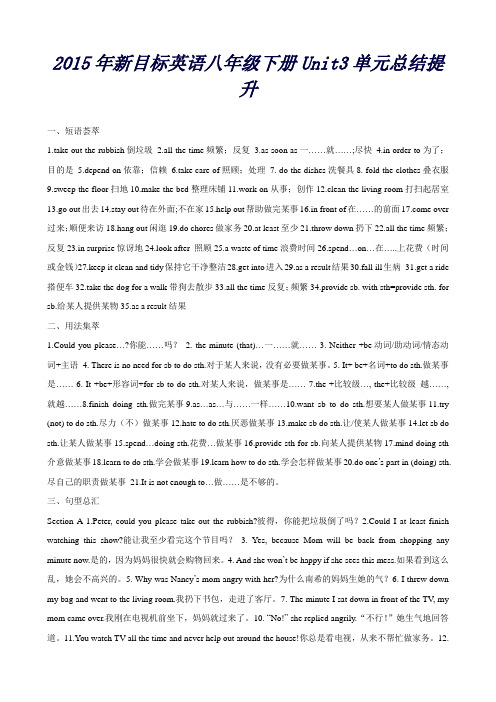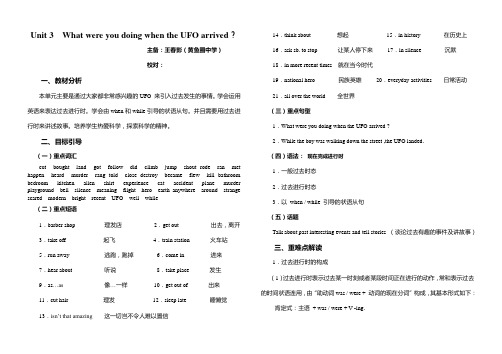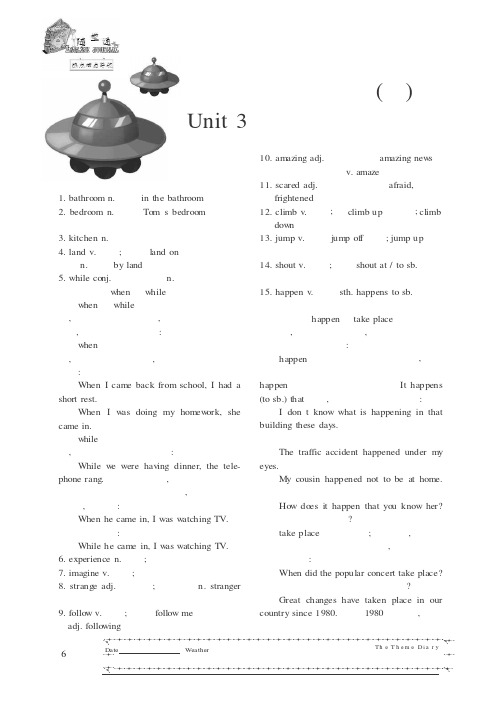新版新目标英语八年级下册unit3知识点总结
新目标八年级英语下册Unit3单元总结提升(知识点总结测试)

2015年新目标英语八年级下册Unit3单元总结提升一、短语荟萃1.take out the rubbish倒垃圾2.all the time频繁;反复3.as soon as一……就……;尽快4.in order to为了;目的是5.depend on依靠;信赖6.take care of照顾;处理7. do the dishes洗餐具8. fold the clothes叠衣服9.sweep the floor扫地10.make the bed整理床铺11.work on从事;创作12.clean the living room打扫起居室13.go out出去14.stay out待在外面;不在家15.help out帮助做完某事16.in front of在……的前面e over 过来;顺便来访18.hang out闲逛19.do chores做家务20.at least至少21.throw down扔下22.all the time频繁;反复23.in surprise惊讶地24.look after 照顾25.a waste of time浪费时间26.spend…on…在…..上花费(时间或金钱)27.keep it clean and tidy保持它干净整洁28.get into进入29.as a result结果30.fall ill生病31.get a ride 搭便车32.take the dog for a walk带狗去散步33.all the time反复;频繁34.provide sb. with sth=provide sth. for sb.给某人提供某物35.as a result结果二、用法集萃1.Could you please…?你能……吗?2. the minute (that)…一……就……3. Neither +be动词/助动词/情态动词+主语4. There is no need for sb to do sth.对于某人来说,没有必要做某事。
新目标人教版英语八年级下册unit3知识点+练习题

新目标人教版英语八年级下册u n i t3知识点+练习题-CAL-FENGHAI.-(YICAI)-Company One1Unit3 Could you please clean your room?Section A(1a-2d)学习目标:1.掌握1a-2d的词语2.学习提出礼貌的请求和请求允许;3.学会使用句型:Could you please...和Could I...;4.学习重点:掌握一些家务活动相关的动词短语。
掌握情态动词could的用法和助动词do的用法。
5.学习难点:掌握情态动词could的用法和助动词do的用法【一】自主学习明确目标1 试读单词,解决语音问题,联系有关旧单词2 查阅下面的短语动词1) 出去吃饭_______________ 2)在外面待到很晚_______________3)去看电影_______________ 4)搭车_______________5)完成做某事_______________ 6)干净整洁_______________ 7)洗餐具_______________ 8)倒垃圾_______________9)叠衣服_______________ 10)扫地_______________ 3.观察以上词组的构成方式:【语言点】1. —Peter, could you please take out the trash请你把垃极倒掉好吗—Sure, Mom.可以,妈妈。
—Could you please do the dishes 请洗盘子好吗—Sorry, I can’t. I have to do my homework.抱歉,我不能。
我得做作业。
(1)在表示请求帮助或请求允许的疑问句中,常用could代替can,以表示礼貌,委婉或不确定的语气,而can则不具备这些语气。
这种情况下不能把could看作can的过去式。
以上两句中用could是为了表示礼貌的请求。
英语人教版新目标八年级下册第三单元Unit-3复习讲义

新目标八年级下册Unit 3 Could you please clean your room?一、词性转换Section A1. sweep → (pt.)swept2. throw → (pt.) threw3. fold→ (pt.) folded Section B1. lend → (pt.) lent2. hate → (pt.) hated3. stress → (v.) stress4. waste → (v.) waste5. provide → (pt.) provided6. depend→ (pt.)depended7. independence →(adj.) independent8. fairness → (adj.) fair9. unfair →(反义词)fair二、短语归纳1. do the dishes 洗餐具2. take out the rubbish倒垃圾3. fold your clothes叠衣服4. sweep the floor 扫地5. make your/the bed 整理床铺6. go out for dinner 出去吃饭7. throw down 扔下8.in surprise 惊讶地9. hang out 闲逛10. hate to do sth. 讨厌做某事11. do chores 做杂务12. enough stress足够的压力13. in order to为了14. provide sth. for sb.向某人提供某物15. get good grades取得好成绩16. mind doing sth. 介意做某事17. depend on依赖;依靠18. look after 照顾,照看19. keep it clean and tidy保持它干净整洁20. get into 进入21. take care of 照顾22. as a result 结果23. do one’ s part in (doing )sth. 做某人分内的事24. get a ride 搭车25.stay out late在外面待到很晚三、句型集萃1. Could you please help out with a few things? 你能帮忙做些事情吗?2.Mom will be back from shopping at any minute now. And she won’t be happy if she sees this mess.妈妈现在随时都会购物回来,如果她看到这些一团糟,会不高兴的。
2013新版新目标英语八年级(下) Unit 3 What were you doing when the UFO arrived?

Unit 3 What were you doing when the UFO arrived?主备:王春影(黄鱼圈中学)校对:一、教材分析本单元主要是通过大家都非常感兴趣的UFO 来引入过去发生的事情。
学会运用英语来表达过去进行时。
学会由when和while引导的状语从句。
并且需要用过去进行时来讲述故事。
培养学生热爱科学,探索科学的精神。
二、目标引导(一)重点词汇cut bought land got follow did climb jump shout rode ran met happen heard murder rang told close destroy became flew kill bathroom bedroom kitchen alien shirt experience cat accident plane murder playground bell silence meaning flight hero earth anywhere around strange scared modern bright recent UFO well while(二)重点短语1.barber shop 理发店2.get out 出去,离开3.take off 起飞4.train station 火车站5.run away 逃跑,跑掉6.come in 进来7.hear about 听说8.take place 发生9.as…as 像…一样10.get out of 出来11.cut hair 理发12.sleep late 睡懒觉13.isn’t that amazing 这一切岂不令人难以置信14.think about 想起15.in history 在历史上16.ask sb. to stop 让某人停下来17.in silence 沉默18.in more recent times 就在当今时代19.national hero 民族英雄20.everyday activities 日常活动21.all over the world 全世界(三)重点句型1.What were you doing when the UFO arrived ?2.While the boy was walking down the street ,the UFO landed.(四)语法:现在完成进行时1.一般过去时态2.过去进行时态3.以when / while 引导的状语从句(五)话题Talk about past interesting events and tell stories (谈论过去有趣的事件及讲故事)三、重难点解读1.过去进行时的构成(1)过去进行时表示过去某一时刻或者某段时间正在进行的动作,常和表示过去的时间状语连用,由“助动词was / were + 动词的现在分词”构成,其基本形式如下:肯定式:主语+ was / were + V -ing.否定式:主语+ was not(wasn’t)/ were not(weren’t)+ v -ing.一般疑问式:Was / Were +主语+ v -ing?特殊疑问式:疑问词+ was / were + 主语+ v -ing?(2)常与过去进行时连用的时间状语有:at that time / moment, at this time yesterday / last night / Sunday / week …, at + 时刻+ yesterday / last night / Sunday … , from + 某时刻+ to + 某时刻+ 表过去的时间,when引导的表示过去某时刻的从句的等。
新目标英语八年级下Unit 3知识要点归纳总结

安徽省濉溪县百善中心学校罗侠新目标英语八年级(下)Unit 3知识要点归纳总结【单词识记】1.bathro om n.浴室in the bathroom 在浴室2.bedro om n.卧室To m ’s bedroo m 汤姆的卧室3.kitchen n.厨房nd v.着陆;降落land on 降落在……上面n.陆地by land 乘陆路5.while co nj.当……时候n.一会儿【辨析】w hen 和w hilew hen 和while 这两个词都可以作连词用,引导时间状语从句,意为“当……的时候”,两者用法区别如下:w hen 引导的时间状语从句中的谓语动词,既可以是延续性的,也可以是终止性的。
例如:When I came back from school,I had ashort rest.我放学回来后休息了一会儿。
When I w as doing my homew ork,she came in.我正在做作业时她进来了。
w hile 引导的时间状语从句中的谓语动词,必须是延续性的。
例如:While w e were hav ing dinner,the tele-phone rang .当我们吃饭时,电话铃响了。
若我们翻译“当他进来时,我正在看电视”时,只能说:When he came in,I was w atching TV.而不能说:While he came in,I w as watching T V.6.experience n.经历;体验7.imagine v.想像;设想8.strang e adj.奇怪的;陌生的n.stranger陌生人9.follo w v.跟随;追随follow me 跟着我adj.follo wing 下面的10.amazing adj.令人惊异的amazing new s令人惊讶的消息v.amaze 使吃惊11.scared adj.恐惧的【同义词】afraid,frightened12.climb v .攀登;爬climb up 向上爬;climbdow n 沿着……往下爬13.jump v.跳跃jump of f 跳离;jump up 跳起来14.shout v.呼喊;呼叫shout at /to sb.朝某人大喊15.happen v .发生sth.happens to sb.某人发生了什么事【辨析】happen 和take place 都有“发生”的意思,都是不及物动词,都没有被动语态。
新目标八年级英语Unit3Couldyoupleasecleanyourroom单元基础知识复习

基础知识迁移 单词回顾
用所给单词的适当形式填空 1.Thank you for ___p_r_o_v_id_i_n_g__ (provide) me with so nice a room. 2.The teacher always tells us__n_o_t _to__w_a_s_t_e_ (not waste) any food because some people in poor areas don't have anything to eat. 3.Betty __f_o_ld_e_d__ (fold) many kinds of animals with the paper for the little children last Sunday.
• 50. 做某人分内的事
单元语法
could的主要用法 A. could 是can的过去式, 表示与过去 有关的能力和推测: e.g. We all knew that the young man
couldn’t be a doctor. B. could可以代替can表示请求, 但语 气较can客气、委婉:
从方框中选出合适的短语, 并用其适当形式填空 as a result, at least, in order to, come over, fall ill, in surprise, as soon as, depend on, take care of, throw down
1.She spent ___a_t _le_a_s_t____ two hundred yuan on the dress. It was a little expensive for her.
9.既然他们和父母住在同一座房子里,他们就应该明白每个人 都应为保持房子的干净、整洁而尽一份力。 __S_in__c_e__ they live in one house with their parents, they should know that everyone should ___d_o____ their ___p_a_r_t__ ___i_n____ __k_e_e_p_i_n_g__ it clean and tidy. 10.孩子们越早学会独立,对他们的未来就越好。 __T_h_e____ __e_a_r_li_e_r _ kids learn to be independent, ___t_h_e___ __b_e_t_t_e_r _ it is for their future.
2020年春人教新目标英语八年级下册unit3知识点分析和练习(无答案)

2020年春人教新目标英语八年级下册Unit3 Could you please clean your room?知识点讲一讲1(section A)1.peter, could you please take out the rubbish? 彼得,请你去倒一下垃圾好吗?2. could you please sweep the floor? 请你把地扫一下好吗?(1)Could +主语+please +动词原形+……?(=Could +主语+动词原形+……,please?)表示委婉地提出请求,意为“请……,好吗?”肯定回答:yes , sure / of course / certainly.否定回答:sorry, I can’t , I have to ……如:Could you please help me with my English ? =Could you help me with my English, please?请你帮助我学英语好吗?(2)take out :意为“带出去;取出”。
如:Take out the rubbish 把垃圾带出去即倒垃圾。
Please take out a piece of paper . 请把这张纸带出去。
Take …out :把……带出去。
如:my father is taking me out to go for a drive. 我的父亲将带我出去开车。
[拓展] 与take有关的短句take off脱掉;(飞机)起飞take place 发生take part in 参加take care of 照顾take after 与…相像it take sb sometimes to do sth 做某事花费某人一些时间。
如:it took me two hours to do my homework. 做家务花费我两个小时的时间。
(3)sweep the floor :意为“扫地”与“家务劳动”有关的短语:Take out the rubbish / trash 倒垃圾fold one’s clothes 叠衣服Clean the room 打扫房间make one’s the bed 铺床Do the dishes 洗餐具do the laundry 洗衣服Clean the floor 擦地板cook dinner 做饭3.you have to clean your room. 你不得不打扫你的房间。
新目标英语八年级下Unit3知识点总结(打印版)

新版新目标八年级下unit3Could you please clean your room? 知识点总结(情态动词表有礼貌的请求,征询许可,祈使句的用法)重点短语1.do the dishes=wash the dishes 洗碗碟2.take out the rubbish 把垃圾拿出去3.fold your clothes叠衣服4.sweep the floor清扫地板5.make your / the bed 铺床6.clean the living room打扫起居室7.No problem.没问题8.go out for dinner.出去吃饭9.stay out late = stay up 熬夜10.g et a ride 开车兜风give sb a ride 让某人搭便车11.h elp out with 给予什么帮助12.b e back = come back 回来13.c ome over to sp 顺便拜访某地;drop in on sb顺便拜访某人14.a sk in surprise惊奇地问=be surprised to ask15.n either of 两者中没有一个(作主语谓语常用单数)--both of16.a s soon as 一……就……as soon as possible尽可能快17.g et something to drink/ eat弄些喝的东西18.h ang out with…同……一起闲逛(hang 过去式hung)19.C ould you please do…? (礼貌请求)你可以做……吗?20.C ould I please do…? (征求意见)我可以做……吗?21.c lean the living room打扫起居室22.d o some washing/ shopping/ cleaning洗衣服/ 购物/ 做清洁23.s tay out late/ until nine呆到很晚/ 呆到9点钟=stay up 熬夜24.g ive me a ride to town开车送我到镇上25.n eed to do something需要做……26.d o one’s part in doing sth尽自己的职责做某事play a part in doing sth 参与干某事do one’s best to do sth尽自己最大努力干某事27.h elp out with a few things帮助做些事情28.a t least 至少29.f inish doing something完成做……30.b e/ come back from shopping购物回来31.a ny minute/ second/ moment now随时;立刻,马上32.i nvite sb sp 邀请某人去某地invite sb to do sth =sb be invitedto do sth邀请某人干什么invite(名词)invitationThanks for inviting me.= Thanks for your invitation.33.b e angry with sb对某人生气be angry at st h因某事而生气34.s olve the problem解决问题35.t hrow down my bag扔下我的书包36.t he minute/ as soon as / the moment I sat down我一坐下就37.t ake the dog for a walk= walk dog溜狗38.r eplied angrily生气地回答39.a ll the time一直40.n ever help out around the house从没帮助做家务41.w ork all day工作一整天42.d o housework all evening整晚做家务43.s hout back吼回去44.f ind the house clean and tidy发现房间干净又整洁【find / make / feel + it +形容词+ to do sth】45.s hare the housework分担家务46.a clean and comfortable home一个干净又舒服的家47.n either of us我们两个都不48.p ass me the salt= pass the salt to me把盐递给我49.b orrow sth from sb= borrow sb sth.从某人那里借某物【borrow 的持续性动词为keep –过去分词kept】50.l end sth to sb= lend sb sth把某物借给某人51.h ate to do/doing something讨厌做……52.e nough stress from school来自于学校的足够的压力53.b e / get stressed out有压力;紧张54.a waste of their time时间的浪费55.s pend … on/ doing sth花时间在……上56.i n order (not)to do something为了做(不做)……57.g et into a good university进好大学58.t here is no need for sb to do something对于某人来说没必要做59.d epend on 依靠……(常接whether引导的宾语从句,不用if)60.d evelop children’s independence 养成孩子的独立(习惯)61.a developing country 一个发展中国家62.a developed country 一个发达国家63.t he idea of fairness公平意识64.f all ill(短暂性)生病=be ill (持续性)65.g rades dropped成绩下降66.a s a result结果;as a result of =because of 因为;由于67.i t’s fair/ unfair for children to do something对于孩子来说,做……是公平的/ 不公平的。
- 1、下载文档前请自行甄别文档内容的完整性,平台不提供额外的编辑、内容补充、找答案等附加服务。
- 2、"仅部分预览"的文档,不可在线预览部分如存在完整性等问题,可反馈申请退款(可完整预览的文档不适用该条件!)。
- 3、如文档侵犯您的权益,请联系客服反馈,我们会尽快为您处理(人工客服工作时间:9:00-18:30)。
Unit 3 Could you please clean your room?Section A1.Could you please do sth ?用于提出请求,希望得到对方肯定回答,语气较委婉。
肯定回答:Sure./ Of course./ Certainly./No problem.否定回答:Sorry , I can’t. / I’m afraid I can’t.在表示请求帮助或请求允许的疑问句中,常用could代替can,以表示礼貌,委婉或不确定的语气,而can 则不具备这些语气。
这种情况下不能把could 看作can 的过去式。
以上两句中用could 是为了表示礼貌的请求。
表示请求帮助或请求允许时,除了can, could 之外,还可以用may,句子的表达方式也各有不同,可以用不同的方式来表示同一个概念。
Could / Can / May I use your car for a day?作允答可以各种各样:如同意可以说Yes,或Sure 或Certainly,还可说Yes, (do) please. 或Of course. (you may / can). 或That's OK / all right.如果不同意,可以说I'm sorry you can't. 或I'm really sorry, but I have to use it today. 要避免说No, you can't. 这样显得很不礼貌。
否定回答通常用委婉语气。
2. take(1)取,拿:Please take some books to the classroom.(2)吃,喝,服用Take some medicine.(3)乘车,船等We can take a bus to the park.(4)花费(时间、金钱)It took me 2 hours to do my homework.take care of 照顾take a walk 散步take awa拿take up占据take place 发生take off脱下;take one’s time慢慢来3.problem question 问题problem客观存在待解决的问题,侧重困难。
Solve the problemquestion因存疑而提出问题,侧重疑惑。
answer the question4.(1)neither adv 也不句子须部分倒装。
此时可用nor替换neitherI don’t like this dress. 我不喜欢这件连衣裙。
Neither / Nor do I. 我也不喜欢。
【注意】肯定句:He likes beef..--So do I. 我也喜欢。
(2) neither …nor… 既不…也不…, 连接两个词做主语,谓语动词就近原则Neither Tom nor I am a student(3) neither 作代词表示“两个都不”,它作主语时,谓语动词常用单数。
Neither of my parents is at home.辨析also, too, either, neither(1)also 较正式,在句中位于行为动词前,系动词、助动词或情态动词之后。
Peter also likes beef. I am also a student. She can also swim.(2)too较口语,多用在肯定句句末。
(3)either 表示“也”时,一般只用于否定句句末。
I don’t have much money either.(4)neither 用作副词,意为“也不”解释,句子须采用部分倒装。
also和too常用于肯定句,neither用于否定句;either表示“也”用于否定,但either…or用于肯定。
5.or否定句也不We don’t have tea or coffee.陈述句或者Answer me yes or no.疑问句还是Do you like red or pink?表转折否则祈使句Hurry up, or you will be late.e over 过来come across (偶然)发现come back回来come up with想出come true实现come from来自come on加油come in/into 进入,进来come out出来,(花)开,(照片)冲洗出来7. surprise(1) in surprise 惊奇地惊讶地He look at me in surprise.(2)可数名词,令人惊奇的事或物That is a big surprise.(3)不可数名词惊奇to one’s surpriseTo my surprise, he didn’t leave.(4)及物动词,使惊奇surprise sbHis success surprised us.8.work on 从事,忙于work at 学习、致力于、在……上下工夫9.borrow some money 借一些钱borrow sth. from sb. 向某人借某物(借入)=borrow sb sthlend sb. sth.= lend sth. to sb. 借给某人某物(借出)You can borrow some money from your brother. 你可以向你哥哥借些钱。
Can you lend me your bike? 你能借给我你的自行车吗?注意:keep 延续性动词I can keep the book for one week.10.pass sb sth=pass sth to sb地给某人某物11.need v 需要作实义动词常用于肯定句(1)人做主语,sb. need to do sth 某人需要做某事(2)物做主语,sth need doing = sth need to be doneneed做情态动词用于否定句或疑问句.(1)needn’t = don’t have to 没有必要(2)need ,must 引导的一般疑问句,肯定回答用must,否定回答用needn’tMust I go there now?Yes,you must/No, you needn’tSection B1.invite v → invitation n邀请(1) invite sb. to do sth 邀请某人做某事(2)invite sb. to +地点邀请某人去某地2.waste(1) v 浪费waste time/money on sthwaste time / money (in) doing sth 在做某事上花费时间/金钱(2) n 不可数浪费废物垃圾a waste of 浪费a waste of time 浪费时间 a waste of money 浪费金钱(3)adj 浪费的无用的荒废的waste paper3.spend/pay/cost/take 花费(1)spend→spent→spent v 花费,主语是人sb.+ spend +时间/钱+on sth 在某事上花费......sb. +spend +时间/钱+(in)doing sthspend on= pay for 支付He spends too much time on the computer games.(2) pay →paid →paid v 支付,主语是人sb.+ pay + 钱+for sth I pay 10 yuan for the book.(3) cost→ cost→ cost v 花费,主语是某物或某事sth cost sb. +钱某物花费某人多少钱A new computer costs me a lot of money.(4)take→took → taken v 花费It takes /took sb. some time to do sth. 做某事花费某人多长时间It takes him 3 hours to do his homework.4.in order to 目的是;为了后接动词原形句首句尾都可以in order to do sth 为了做某事5.provide v 提供为应急等做好准备而提供;供给provide sth. for sb. 为某人提供某物= provide sb. with sth.(1)offer侧重表示愿意给予offer sb. sth. = offer sth to sb. 对某人提供某物offer to do sth 主动提出干某事(2) supply定期供应, 强调替代或补充所需物品supply sb. with sth=supply sth. to sb. 为某人提供某物6.depend on 依靠;信赖It all depends.=That depends. 视情况而定7.since conj.(1)由于,因为,既然引导原因状语从句(表示对方已知的事实或理由,常放在句首)Since we don’t have money,we can’t buy a house.(2)自....以后,自.....以来引导时间状语从句It’s two years since we visited your mother.8.keep +sth /sb. +adj. 使......处于某种状态keep 系动词保持keep + adj . We must keep healthy.实义动词保持;继续(1) keep ( on ) doing sth 继续做某事He was in great pain but he kept on working(2) keep sb. doing sth 让某人一直做某事I’m sorry to have kept you waiting for so long.9. as a result 结果因此(插入语,放在句首,用逗号隔开)as a result of 由于.....,作为.......的结果10.the + 比较级,the + 比较级越...... 越......The faster, the better.11.independent adj 独立的,自主的12. make → made →made v. 做,制作,使得(1) make sb/sth + 形容词让某人或某物… make you happy(2) make sb/sth do sth 使某人做某事make me laugh.make sure 确信make a dialogue编对话make a mistake犯错误(by mistake由于疏忽) make a noise吵闹make faces做鬼脸make friends (with)和..交朋友make room for给..让地方make tea沏茶make money赚钱make a decision作出决定make the bed 整理床铺make a living 谋生make fun of = laugh at 取笑13. have time to do sth.有时间做某事have time =be free 有空14. get into =enter 进入get up 起床get back 返回get over 克服get dressed穿衣get into进入get/be lost丢失get off/on下/上车get on well with sb.与某人相处得好get out of从…出来get warm 变暧get ready for +n.为…做准备get ready to do sth.准备做某事get well康复get a chance 有机会、得到机会get/go to sleep(fall asleep)入睡相关:(be asleep睡着)15.get older 长大get/ become/ go辨析:(1)get+adj较多地与形容词比较级连用The days are getting longer and longer.(2)become 强调变化的结果It's becoming colder and colder.(3)go+adj. 表示令人不快的事情go bad变坏,go blind变瞎,go hungry挨饿16. do one’s part 尽职责;尽本分d o one’s part in doing sth 在做某事上尽职责17.develop independence 培养独立意识develop v→development n发展→developing adj.发展的→developed adj. 发达的a developing country 一个发展中国家 a developed country 一个发达国家18.take care of 照顾take photos/pictures 照像take away拿走take out取出(work out算出) take care当心take medicine服药take place发生take one’s temperature量体温take one’s time别着急take a walk散步。
